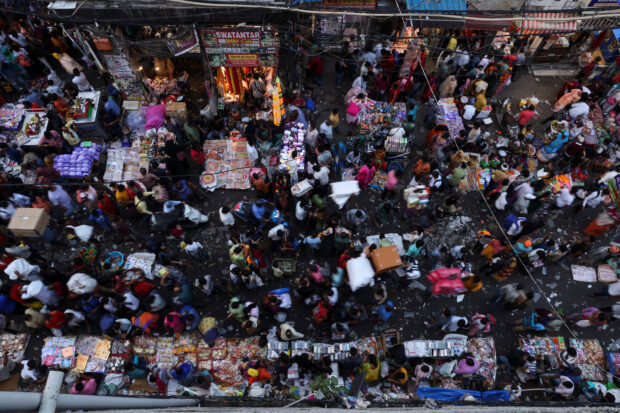India to have 2.9 million more people than China by mid-2023, UN estimate shows

FILE PHOTO: People shop at a crowded market in the old quarters of Delhi, India, October 11, 2022. REUTERS/Anushree Fadnavis/File Photo
NEW DELHI — India is on its way to become the world’s most populous country, overtaking China with almost 3 million more people in the middle of this year, data released on Wednesday by the United Nations showed.
The demographic data from the United Nations Population Fund’s (UNFPA) “State of World Population Report, 2023” estimates India’s population at 1,428.6 million or 1.4286 billion against 1.4257 billion for China.
The United States is a distant third, with an estimated population of 340 million, the data showed. The data reflects information available as of February 2023, the report said.
Population experts using previous data from the UN have projected India would go past China this month. But the latest report from the global body did not specify a date for when the change would take place.
UN population officials have said it was not possible to specify a date due to “uncertainty” about the data coming out of India and China, especially since India’s last census was conducted in 2011 and the next one due in 2021 has been delayed due to the pandemic.
Article continues after this advertisementAlthough India and China will account for more than one-third of the estimated global population of 8.045 billion, the population growth in both Asian giants has been slowing, at a much faster pace in China than in India.
Article continues after this advertisementLast year, China’s population fell for the first time in six decades, a historic turn that is expected to mark the start of a long period of decline in its citizen numbers with profound implications for its economy and the world.
India’s annual population growth has averaged 1.2% since 2011, compared with 1.7% in the 10 years previously, according to government data.
“The Indian survey findings suggest that population anxieties have seeped into large portions of the general public,” Andrea Wojnar, Representative for UNFPA India, said in a statement.
“Yet, population numbers should not trigger anxiety or create alarm. Instead, they should be seen as a symbol of progress, development, and aspirations if individual rights and choices are being upheld,” she said.